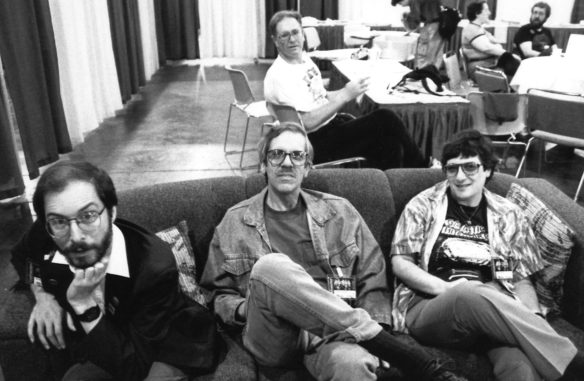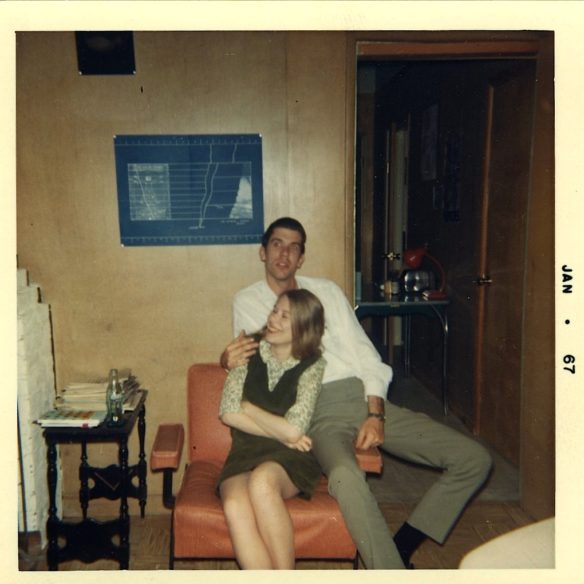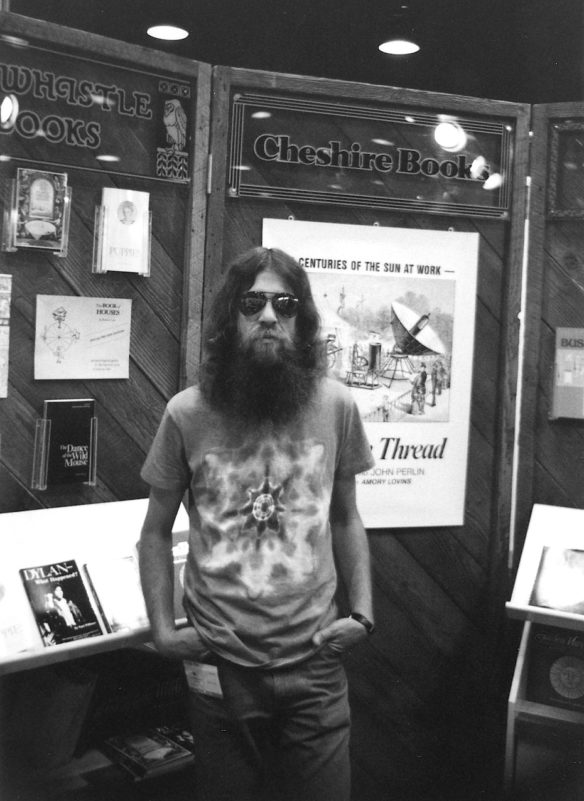
Acclaimed fanzine fan Robert Lichtman died July 6 at the age of 79. He was an 18-time FAAn Award winner — six for his fanzine Trap Door, 10 for his letters of comment, and twice scored “Number one fan face”. Trap Door also was a two-time Hugo finalist. (Issues 21-34 can be downloaded from eFanzines.com.)
Lichtman was born in Cleveland in 1942. His family moved to Southern California in 1951, and he lived there until 1965, except for a six-month period in 1961 spent living in (mostly) Ray Nelson’s attic in the Bay Area.
He discovered fandom in 1958 when he encountered Robert Bloch’s fanzine review column in an issue of William Hamling’s Imagination. That same year he produced his first genzine, PSI-PHI, coedited with Arv Underman.
After discovering fandom, he joined LASFS. He even became one of the international members of the short-lived Young Science Fiction Readers Group (YSFRG) formed in 1960 for the British Science Fiction Association’s under-25 members.
Upon graduation from university, he returned to the Bay Area, settling in San Francisco just in time for the beginnings of what he called “the Hippie Era.”
He reflected on his early life in a File 770 comment last year:
Now and then I wonder what my life would have been like if I hadn’t discovered fandom at 15. My parents wanted me to become a banker, a concept that made me want to throw up. (I came sorta close 1965-68, when I worked for credit rating agency Dun and Bradstreet as a “credit analyst.”) I didn’t meet my previous wife, the mother of my four sons, via fandom (through Stephen Gaskin’s Monday Night Class, instead, when I was being a semi-hippie living near but not in Haight-Ashbury) — but having them in my life, and so supportive, I count as a happy blessing. Before her, there was Margo Newkom, whose name might be familiar to some of you. She was a “Berkeley fringefan,” and also very funny and smart (and beautiful). We never married, but we had some good years together.
In 2000 he married his second wife Carol Carr; she died in 2021.

In the Seventies Lichtman and his girlfriend (soon to be his wife, and six months pregnant) followed friends to live on The Farm, a 1,700-acre commune in Tennessee. Although he was largely inactive in fandom throughout that decade its myths returned to mind now and then. Lichtman wrote, “Sometimes we would get together and laugh about how we’d more or less ended up in ‘the love camp in the Ozarks’ of which the notorious Claude Degler wrote over half a century ago — though we were on the Highland Rim, not in the Ozarks. Close enough, we thought.”

He stayed there until the summer of 1980 when — after the end of his marriage — he moved to Glen Ellen, California and began working with Paul Williams (the one who began Crawdaddy) on his Entwhistle Books publishing venture. Lichtman had experience doing sales and promotion for the Farm’s publishing wing, The Book Publishing Company. Through Williams he started seeing issues of Dan Steffan and Ted White’s fannish fanzine Pong. Lichtman wrote a letter of comment to it, and soon found himself back in fandom.
In 1983 he started publishing Trap Door. Beginning in 1986 he took up the office of Secretary-Treasurer of FAPA, fandom’s oldest amateur press association (founded in 1937). By the end of the decade he was once again such an integral member of fandom that he was voted the Trans-Atlantic Fan Fund delegate of 1989 and attended the UK Eastercon. (Some of his extensive notes towards a trip report are here.)
Prior to the advent of the internet he regularly edited collections of hard-to-come by fanwriting and made them available . These included a collection of F. T. Laney’s fan writing titled Ah! Sweet Laney!, a fanthology drawing from Lee Hoffman’s fanzine Quandry titled Some of the Best from Quandry, and a collection of Walt Willis’s “Fanorama” columns (from Nebula, the British SF magazine) titled Fanorama.
He also edited Fanthology 92, Fanthology ’93 and Fanthology 1994, which were published by others.
When the internet finally caught up to him, he produced a PDF edition of Jack Speer’s Up To Now, a history of fandom as of 1939, (available on eFanzines.com).
Lichtman was a pillar of Corflu, the annual fanzine fans convention, where he was often honored. In addition to all the FAAn Awards he won there, in 1992 he was named Past President of Fan Writers of America (fwa), and he received the Lifetime Achievement Award at Corflu in 2020.
Discover more from File 770
Subscribe to get the latest posts sent to your email.

While Robert had physical form, he shared the essence of his thoughts with us. And now, even though the Trap Door is for ever closed, his mind will continue to ripple across the Atlantic and through the very fabric of the universe. We never met in the flesh. Yet, he was one of those who contributed to a profound purpose of my own being. I can not grieve his passing. Only celebrate that he has lived. I am deeply and sincerely grateful for that, and raise my glass this evening to the closed door and to more open windows.
As sometime Vice President of FAPA, and as emergency editor after Official Editor Seth Goldberg died in 1997, I want to confirm that I found Robert Lichtman as Secretary-Treasurer an absolute rock of reliability and helpfuness. Having him there to rely on made it possible for me to pick up the pieces after Seth died, and I will always be grateful.
Lichtman looked like the picture at the top of this article by the time I met him in the mid-80s and afterwards as long as I knew him. I never met any of the Lichtmans in the other photos.
Very sorry to hear of Robert’s passing. I knew him for many years through FAPA, and it was great to catch up with Robert (and to meet Carol) during my TAFF trip in 2009.
For fanzine fans: All of the issues of Trap Door are online at Fanac.org:
https://fanac.org/fanzines/Trap_Door/
I didn’t have the fortune of crossing paths with Robert very often, as we lived on opposite coasts. Cannot remember the last time I saw him in person, it was so long ago, but we did correspond by email once in a while. One thing that really impressed me was his encyclopedic knowledge of fanzines and fanzine publishers. The times I was looking for a specific fanzine he always came through. I never got to see his fanzine collection, but it must be awesome in its scope and contents. A truly good guy. We’re all already missing him greatly.
I enjoyed getting to know Robert from my multiple wanderings in and out of FAPA. He was more responsible for keeping that noble institution around in the 21st century than any other member.
Oh, no. What a tragic loss. When I first met him in 1981, at that year’s Westercon, he was still the long-haired hippie off the farm in Tennesee. One of the other attendees that weekend was Pete Stampfel (famous as a member of The Holy Modal Rounders and the Fugs and, later, for marrying Betsy Wollheim). Pete was short-haired at that point and Robert was not only hairy but was wearing a tied-dyed T-shirt. Because of that people were constantly approaching him to tell him how much they loved the Fugs or THMRs — even when Pete was standing right next to him. This was the cause of much amusement for everybody except, of course, Robert. He got his hair cut soon after.
Robert and I shared many creative projects together and I considered him one of my closest fan friends. I somehow had an inkling that he might not outlive his beloved Carol by very long. They were so bonded that I feared he wouldn’t feel whole without her. My wife and I had the pleasure of his company in our home a couple of times on both coasts and he and Carol actually drove up here to Portland and stayed with us for a weekend visit, and it was well past the time that she enjoyed travelling any more, so we took it as a great compliment and a unique opportunity for fannish fun. We will miss them both forever.
Damn it, my tiny world has just gotten intolerably smaller.
The 1966 photo, which I took when I was in the Bay Area after the 1966 WesterCon in San Diego, shows Robert with Margo, when they lived on Lundy’s Lane. The name comes from a famous battle in Canada’s history.
There’s a street called Lundy Lane in the town of Los Altos in the Bay Area. Is that the one you’re referring to? If so, it’s a multiple fannish street, as Bill Welden and his wife Jo Wilcox used to live there, some years later. (Actually, I think Jo was already there, as it was her parents’ house.)
Robert lived for a time on a street called Lundy’s Lane in Bernal Heights, San Francisco. I visited him there once and he gave me an old ditto machine he’d used to publish some of his early fanzines.
Rotten, sad news, but thank you for this detailed obituary, Mike. I’ve posted a link on Robert’s Facebook placeholder page, which I understand his sons are reading as well as friends.
And, yes, Steven H Silver has already included Robert with the all too many others on Chicon 8’s In Memoriam list. So that’s been seen to.
A lynchpin. A giant. A great editor. A great fan. Missed beyond comprehension these last years, now, as he cavorts in the great con in the sky we mere mortals shall mourn—and celebrate his memory.
—Wm.
No doubt, if there is a Heaven, it has a trap door that has opened for him to enter through.
Pingback: Top 10 Stories for July 2022 | File 770
During my house-sitting stints in Point Reyes California around 2014 2015, Bob and I met up a few times in Berkeley at Saul’s for lunch.
He filled me in on most of what is in this tribute. We had a few chuckles about our divergent paths and the Bay Area in the 60s. We did publish PSI-PHI on an old spirit duplicator abetted by free samples from my father who sold printing paper. (Note what I take for reams of paper in the 1967 photo). I was also a brief member of LASFS. He sent me Trap Door for several enjoyable issues.
We later discussed the onset of his illness which was slowly progressive. Then as most often happens, our paths diverged. He would have been an excellent banker but to my mind he made a better and certainly more exciting choice. RIPRL